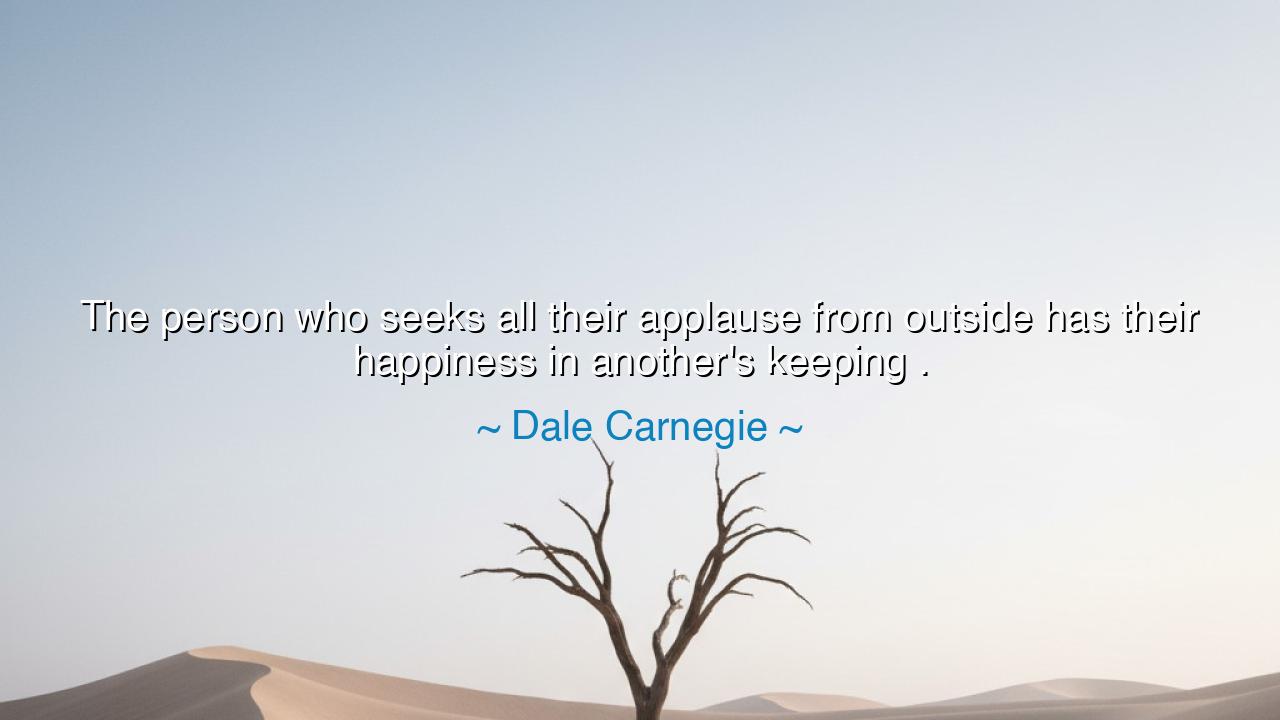
The person who seeks all their applause from outside has their
The person who seeks all their applause from outside has their happiness in another's keeping .






“The person who seeks all their applause from outside has their happiness in another’s keeping.” Thus spoke Dale Carnegie, a master of understanding the human heart and its desires. His words are not merely counsel for the ambitious, but a mirror held to the soul — reflecting one of the oldest truths known to humankind: that the man or woman who lives for the praise of others becomes a slave to their opinions. In this saying, Carnegie warns us that true happiness cannot be built upon the shifting sands of external approval. For the applause of the crowd fades like the echo of thunder, and those who depend upon it will always find themselves hollow when the noise dies away.
The origin of this wisdom lies in Carnegie’s deep study of human nature. Born in an age of industrial striving and social competition, he saw that many sought validation not from the quiet voice within, but from the fleeting admiration of the world. In his teachings — found in his classic works on influence, communication, and self-mastery — he urged people to build their worth not on applause, but on self-respect. He knew that the approval of others can be sweet as honey, but that too much of it makes the heart weak, dependent, and afraid. Thus he taught that the wise person must cultivate an inner peace that no praise can inflate and no criticism can destroy.
To “seek all their applause from outside” is to live as a beggar of joy. It is to wander the streets of life with an empty cup, waiting for others to fill it with their compliments, their attention, their admiration. But such gifts are fickle, for people are changeable, and the favor of the crowd is as fleeting as the wind. The one who depends on it lives not as a free soul but as a captive, chained to the moods of others. Happiness in another’s keeping is not happiness at all — it is bondage disguised as success. Only when a person learns to find approval within — to be content in their own conscience — can they stand firm amid both praise and reproach.
History has shown us many who learned this truth through suffering. Consider Marcus Aurelius, the philosopher-emperor of Rome. Surrounded by flatterers, generals, and courtiers, he ruled an empire yet sought no applause from it. In his meditations, he wrote, “Be content with what you are, and wish not for the applause of men.” For he knew that the love of the crowd is a flame that burns as quickly as it lights. His peace came not from what men said of him, but from what he knew within himself — that he had acted justly and with purpose. Like Carnegie centuries later, Marcus understood that true mastery of the self is found not in controlling others’ opinions, but in freeing oneself from their power.
And yet, how easy it is to fall into the trap of seeking praise! From the artist who measures their worth by applause, to the worker who longs for approval, to the youth who lives for the admiration of peers — all become prisoners of unseen masters. They forget that the applause of others is not the measure of greatness; it is often only the noise that follows it. The greatest deeds in history — the acts of compassion, of courage, of invention — were not born from a desire for recognition, but from the quiet conviction of purpose. The applause came later, and even then, it mattered little to those who acted from truth.
Carnegie’s wisdom, therefore, is both a warning and a liberation. It warns us that when we hand our happiness to others, we surrender our peace to their whims. But it also liberates us, reminding us that joy is a power we can reclaim. To keep one’s happiness within is to become untouchable by the world’s changing tides. It is to stand, like an oak in the storm, unmoved by the winds of opinion. The wise man smiles when praised, yet does not crave it; he listens to criticism, yet does not lose himself in it. His compass is internal, guided by conscience, by love, by truth.
So, dear listener, take this lesson to heart: Do not build your happiness on applause. Seek not to please every eye or win every heart, for such a path ends in emptiness. Instead, live by your own principles. Let your worth be measured by your integrity, your kindness, your courage. When you succeed, rejoice quietly. When you fail, learn without despair. Praise will come and go, as all things do — but the peace of self-acceptance endures.
For as Dale Carnegie teaches, the one who keeps their happiness in their own keeping walks as a free soul. The world may cheer or fall silent — it matters not. For the joy of such a person is not the echo of applause, but the steady music of a heart in harmony with itself.






AAdministratorAdministrator
Welcome, honored guests. Please leave a comment, we will respond soon